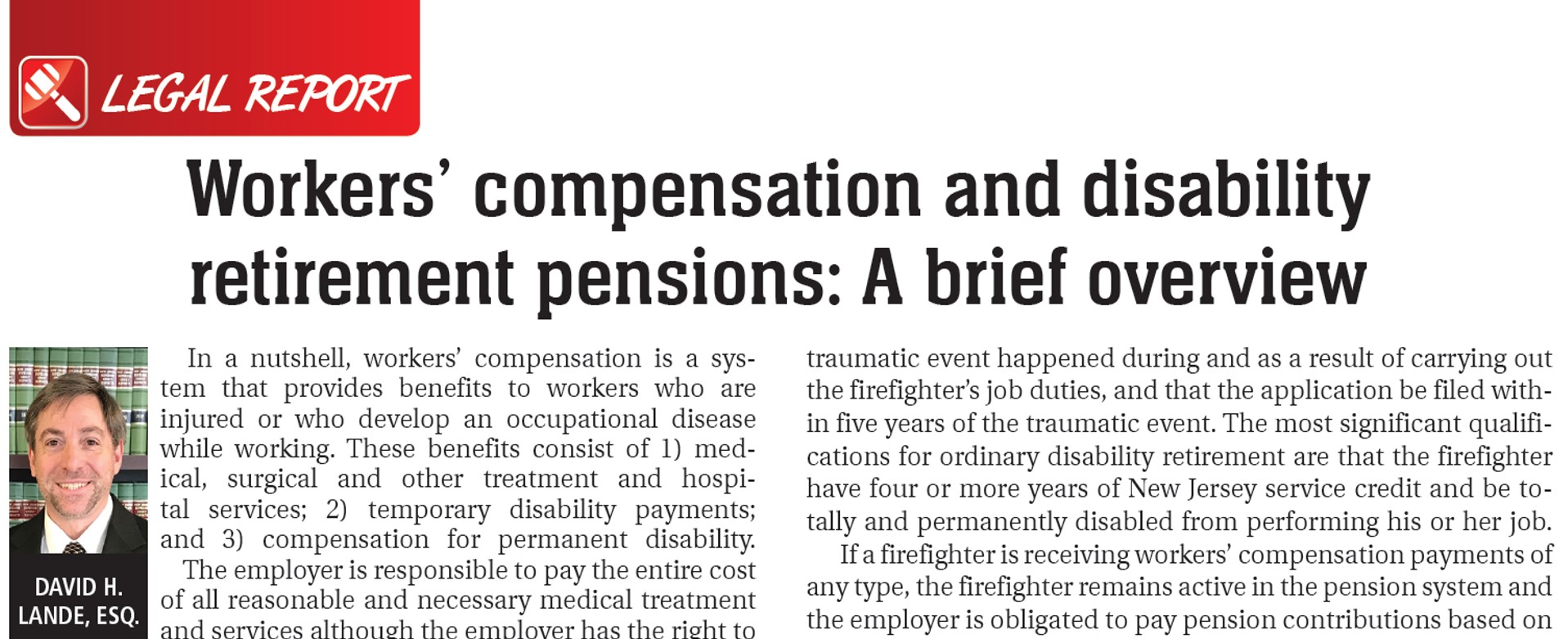Partner David H. Lande, ESQ. was featured in the Legal Report in February’s issue of the New Jersey Fire Magazine. He discussed workers’ compensation and disability retirement pensions. Click the link below to view the full article.
Workers’ compensation and disability retirement pensions: A brief overview
In a nutshell, workers’ compensation is a system that provides benefits to injured workers who are injured or who develop an occupational disease while working. These benefits consist of 1) medical, surgical and other treatment and hospital services, 2) temporary disability payments, and 3) compensation for permanent disability.
The employer is responsible to pay the entire cost of all reasonable and necessary medical treatment and services although the employer has the right to select the medical providers and control the injured workers’ medical treatment. Firemen receive full salary while out on workers’ compensation for up to one year after which the benefit is paid at 70% of gross average weekly wages up to a maximum set by the Department of Labor each year. Permanent disability is paid for disability that impairs the ability to work no matter how slight and/or the ability to engage in ordinary pursuits of daily life and is based on a schedule of disabilities.
Additionally, if a fireman is injured in the line of duty and is unable to return to work, a disability retirement pension is available through the Police and Firemen’s Retirement System if certain qualifications are met. There are two types of disability retirement pensions: accidental disability retirement and ordinary disability retirement. Accidental disability pays an allowance of 2/3rds of the fireman’s salary at the time of the “traumatic event” or at the time of retirement, whichever is higher. Ordinary disability pays an allowance of 40% of final compensation or 1.5% of final compensation for each year of service, whichever is higher. An employer can apply for a retirement pension on the fireman’s behalf which is commonly known as involuntary disability retirement.
Generally speaking, the most significant qualifications for accidental disability retirement are that the fireman be totally and permanently disabled from performing his/her job, that the disability is the direct result of a “traumatic event,” that the “traumatic event” happened during and as a result of carrying out the fireman’s job duties, and that the application be filed within five years of the “traumatic event.” The most significant qualifications for ordinary disability retirement are that the fireman have four or more years of New Jersey service credit and be totally and permanently disabled from performing his/her job.
If a fireman is receiving workers’ compensation payments of any type, the fireman remains active in the pension system and the employer is obligated to pay pension contributions based on the fireman’s salary at time the fireman starting receiving workers’ compensation payments. This obligation ceases though upon certain events such as when a disability retirement pension is approved. If a fireman is approved for accidental disability retirement and is receiving workers compensation payments, the pension portion of the disability retirement allowance will be reduced dollar-for-dollar by the amount of workers’ compensation payments received. If a fireman is approved for ordinary disability retirement and is receiving workers’ compensation payments, the workers’ compensation payments will be reduced dollar-for-dollar by the amount of the pension portion of the disability retirement allowance. There are certain situations where a fireman can receive a disability pension allowance and a workers’ compensation award without an offset to either such as where a third-party negligence case is also pursued and a settlement or judgment is obtained or if a “gap” period exists where a fireman is entitled to workers’ compensation payments due prior to the effective date of a disability retirement pension.
About the author: Attorney Lande is a partner with Gill & Chamas and oversees the firm’s workers’ compensation department. He is a certified workers’ compensation law attorney with more than 25 years of litigation and trial experience. He is also a military veteran having served with the 82d Airborne Division.




